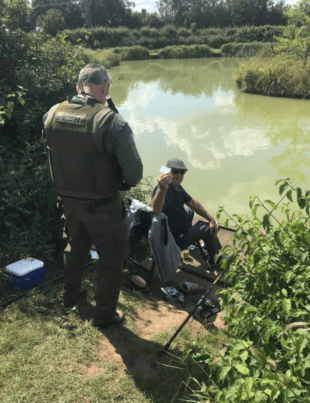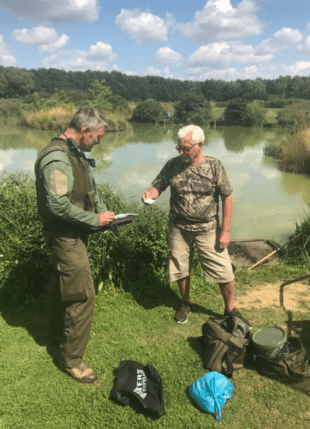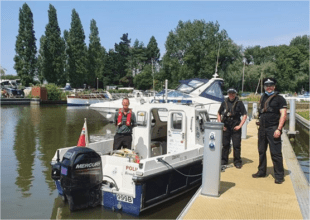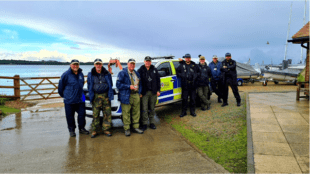Adrian Saunders, Senior Advisor for Fisheries Incidents and Compliance, reflects on the fisheries enforcement work of the Environment Agency in 2021, and the partnerships that help us to crack down on illegal fishing to protect our fisheries.
It has been another difficult and challenging year for everyone, including our fisheries enforcement officers. But throughout it all, our teams have continued to tread the banks of our rivers and still waters, checking rod licences and targeting poaching hotspots.
We will not hesitate to pursue offenders involved in unlawful fishing activity through the courts. In autumn 2021, a Gloucestershire fisherman who illegally caught valuable elvers (juvenile eels) was ordered to pay the Environment Agency costs of £10,425.40, a £300 fine and a £30 victim surcharge. His fishing net was also seized and destroyed.
Operation LUNGFISH
In the summer, officers took part in a month-long enforcement campaign, known as Operation LUNGFISH, to crack down on illegal fishing and poaching.
Launched on 23 July, enforcement activity ran until the end of August. The aim of the campaign was to detect licence evasion and other illegal activity, such as the use of unauthorised traps. In total, 4,500 licences were checked, and 839 notices were issued for fisheries-related offences.

Highlights from Operation LUNGISH included:
- A joint patrol in Essex, with police and Angling Trust Voluntary Bailiff Service (VBS) volunteers at Hanningfield Reservoir saw 41 licence checks carried out and 4 offence notices issued to anglers who were fishing illegally without a rod licence.
- Patrols with Norfolk Police on the Broads and Pentney Lakes resulted in offence notices being issued to anglers without fishing licences and unattended nets being seized. Officers also visited 5 fisheries suspected of stocking sturgeon. Sturgeon are non-native species and cannot be legally kept in any fishery in England. These fisheries continue to be under investigation.
- 118 spot checks were carried out in Lincolnshire with sixteen anglers served notices for fishing offences. Our enforcement team worked with the East Midlands Police Wildlife Crime Group and the Angling Trust VBS.
- Illegal crayfish traps were removed from the Birmingham and Fazeley canal at Minworth and the Staffs and Worcester canal at Weston in Staffordshire, and destroyed.
- Fisheries Officers were joined by the Sussex Police rural crime team and Angling Trust VBS to conduct a fisheries enforcement blitz across East and West Sussex & the Kent border. In total more than 40 venues were visited, resulting in 64 offences detected.
During Operation LUNGFISH, officers used the latest technologies, including drones and bikes, to reach difficult terrains. Officers are now using a thermal imaging camera for fisheries enforcement patrols in Cambridgeshire, Bedfordshire, Suffolk, Norfolk, Hertfordshire and Buckinghamshire. The teams also have the ability to record and retain video footage to use as evidence.

Autumn enforcement:
Enforcement officers seized more than 20 illegal fish traps and other equipment in the North East. The work is part of the Environment Agency’s North East crackdown, called Operation CREEL, that aims to protect threatened species such as the white clawed crayfish and European eel.
Members of the public reported illegal practices including crayfish trapping and fish theft, particularly in the River Skerne and nearby ponds which helped authorities to track the culprits.
In November, Environment Agency officers and the Angling Trust held a training day for the Cumbria Police Rural Task Force to help reduce illegal fish activities in Cumbria.

The training, which was supported by fisheries licence income, was held at Clearwater Fishery, Carnforth. It involved practical workstations focussed on fisheries offences contained in the Theft Act, including the illegal use of gill nets and traps for taking freshwater fish. Other sections included rod licence evasion and how it affects fisheries. Input from Angling Trust coaches was also provided with 1:1 coaching for any police officers that wanted to experience angling and its positive wellbeing benefits.
Working with the police and the Angling Trust:
Our enforcement work is often delivered in partnership with the Angling Trust Voluntary Bailiff Service, councils and local police forces in England to pool resources, skills and powers. Joint patrols have proven to be very effective at tackling a wide range of issues that prevent safe and accessible fishing opportunities.
The Voluntary Bailiff Service volunteers are the eyes and ears on the riverbank reporting fisheries crime. So far in 2021, the Angling Trust inducted a further 71 volunteers; the total number across England will be around 600 by the end of 2021.
I am particularly excited to announce continued roll out of the second phase of the VBS pilot, which sees existing volunteers trained to use enforcement powers, allowing them to check licences and compliance with byelaws to prevent illegal fishing. Six new volunteers will be working in East Anglia in the Great Ouse catchment. If you would like to join the VBS and help combat illegal fishing, please sign up on the Angling Trust’s website here.
In 2022, our enforcement officers will continue to go the extra mile to protect our valuable fish stocks whilst sending a clear message to those who break the law. Illegal fishing won’t be tolerated, and we will continue to crackdown on those who think they can get away with it.

We owe a huge thanks to all members of the public for reporting illegal activity. If you see or suspect illegal fishing activity, you can report it to our 24-hour incident hotline on 0800 80 70 60.
If you’re thinking of going fishing, don’t forget to buy a rod licence. It’s quick and easy and costs just £30 for a whole year They’re available via the Post Office website, on www.gov.uk and by phone.

2 comments
Comment by Ian Cleaver posted on
It would be helpful to provide a link to somewhere a map would be available, illustrating river areas where it is free to fish?
Comment by Dave Digby posted on
There are thousands of miles of waterways in th UK - if at all possible, it would take an age to complete! Your best bet is social media groups - they offer loads of advice and information on free waters!